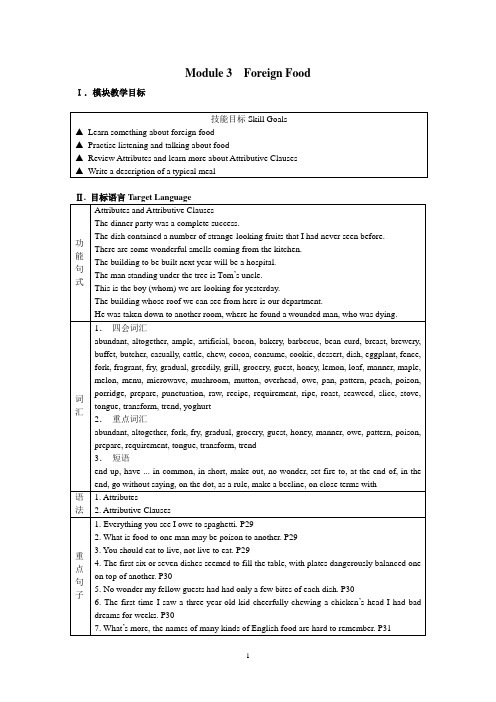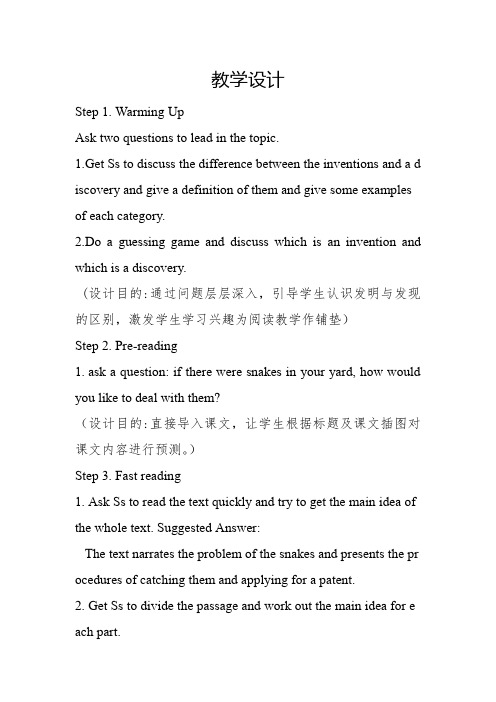高中英语_高二英语选修八(外研版)模块三听说课教学设计学情分析教材分析课后反思
高中英语外研版高中选修8Module3ForeignFood-教案

Book8 Module 3Foreign Food群文阅读语篇教学设计“基于核心素养,教学目标引领,提高课堂教学质量”主题语境:人与社会——跨文化沟通语篇类型:介绍性文章(多模态形式)授课时长:一课时(60分钟)一、教材分析:本模块采用题材、功能、结构和任务相结合的体系,彰显了教材的特点。
本课分为三个部分,第一部分为Module 8 Book 3 Reading and V ocabulary中的Passage1, 本文是记叙文,一个美国人用幽默的方式介绍了他在中国的感受到的几次饮食文化差异,这个部分为课堂的核心,采用不同的方式精讲,第二部分对课前预习部分的讲解,选自《阅读联播》教程,Eating Customs;是英国一家人来中国旅游,在北京体验到的不同饮食习惯差异;第三部分为Module 8 Book 3 中的Reading(2)Passage 3: An Embarrassing Moment. 讲述英国国王Edward vii为他的客人化解了一场餐桌礼仪的尴尬的故事。
该课把这三篇文章融为一体,目的是通过在不同的语境介绍不同的饮食文化差异,最终升华到一个主题意义,培养学生的批判思维,我们应该包容的姿态接受他人文化的唯一性,尊重文化的多样性。
二、学情分析高三学生已经具备了一定的阅读能力,词汇基础,文章的分析能力;虽然这三篇文章的题材都是记叙文,但是选8的教材在词汇上,语言表述上升了一定的难度,给学生设置一定的挑战性,而且本课堂的容量较大,目的是为了通过不同的文章找出它们的共同点,深化到相同的主题意义,理解文化内涵,表达自己的观点。
三、教学重点:四、教学难点:五、教学和学习方法六、课程资源:相关视频,课件,有关内容的资料,学生用导学案。
七、教学安排价。
高中英语_Module3,教学设计学情分析教材分析课后反思

高中英语_Module3,教学设计学情分析教材分析课后反思Teaching design(教学设计)Teaching aims of this class contains the knowledge aim: to master some useful words and expressions through the text; the ability aim: to enhance the reading skills such as predicting the content,skimming, finding the details and summarizing the main idea; the emotion aim: to cultivate the proper attitude towards the friendship and solve the similar problems in their own life.This class adopts the students-centered approach, task-based method and communicative method.Teaching procedures. It mainly includes 7steps. Step I Warming-up ,用《朋友与熊》视频导入。
Step II Fast reading ,设置两种题型,让学生对文章有个整体了解。
StepIII Careful –reading ,用找段落大意,问答题,判断对错的形式来让学生掌握细读。
Step VI Consolidation ,用挖空的形式,来让学生掌握全文 Step V Retell the whole story,time line以时间为主线。
设置这个题型,来提高学生的口语。
Step VI Discussion,在这个题型中,激发学生的灵活性,促进他们开拓思维,提高口语。
高二外研版选修八备课资料:Module 3 教案 The First Period Reading(精修版)

外研版英语精品资料(精修版)Module 3 Foreign FoodI.模块教学目标Ⅱ. 目标语言Target LanguageIII. 教材分析与教材重组1. 教材分析本模块以Foreign Food为话题,通过与饮食文化相关的材料反映了世界各地饮食文化的差异和丰富多彩,从而激发学生的学习兴趣和了解世界饮食文化的愿望,使他们更加热爱生活,追求生活中美好的事物。
本模块所选内容贴近学生生活,教师可以借助听、说、读、写和讨论等一系列扎实有效的教学活动,充分调动学生的积极性,提高其语言运用能力。
1.1 INTRODUCTION 以几幅食物图片切入话题,然后让学生讨论有关食物的谚语,为后面的阅读做好铺垫。
1.2 READING AND VOCABULARY(1)中包括两篇文章:第一篇文章主要通过一个美国人第一次参加中国宴席和吃臭豆腐的经历以及他对于中餐从吃惊到接受的过程,反映了中餐的特点和东西方饮食文化的差异;第二篇是描述一个中国人第一次在英国吃“西餐”的经历,以及因饮食文化的差异所引发的感受。
从这两篇文章,我们可以看出中西方饮食文化的差异。
两者各有千秋,“中餐”种类丰富,味美可口,而“西餐”似乎很简单,但餐桌礼仪却值得我们借鉴学习。
这两篇文章语言简练,幽默风趣。
与课文相关的练习Activities 1 and 3 要求学生采用快速浏览的方法确定相关的主题,潜移默化中培养学生skimming 这一重要阅读技巧;Activities 4 and 5 要求学生掌握与课文相关的语言知识;Activities 6 and 7 要求学生进一步理解课文并在此基础上进行讨论。
1. 3 GRAMMAR 分两部分。
GRAMMAR(1)旨在通过一系列语法练习,使学生掌握单词、短语和不定式,-ing形式, -ed形式作定语的用法。
GRAMMAR(2)通过多种形式的语法练习,要求学生掌握定语从句中的关系词及非限制性定语从句的用法。
高二外研版选修八备课资料:module_3_教案_附件

附件Ⅰ. 课文注释与疑难解析1. Everything you see I owe to spaghetti.a. you see为定语从句,前面省略了关系代词that,当先行词为something, anything, everything, nothing等不定代词时,引导定语从句只能用that而不用which。
如:I will do everything that I can to help you.我将尽我所能来帮助你。
b. owe ... to ... (常与to连用)归功于;由于;欠,欠债She owes her success to good luck.她把成功归功于幸运。
The young writer owed his success to his teacher’s encouragement.年轻作家把自己的成功归于他老师的鼓励。
He still owes for what he bought last summer.他去年夏天买东西欠的钱还未还呢!2. No wonder my fellow guests had had only a few bites of each dish.难怪和我一块的客人每盘只吃一点菜。
(It’s) no wonder (that) 难怪;并不奇怪;当然。
No wonder he is not hungry; he has been eating sweets all day. 难怪他不饿,他整天在吃糖果。
Peter is always working hard. No wonder that he passed the exam successfully.彼特学习总是很努力,他顺利通过考试并不奇怪。
3. The first six or seven dishes seemed to fill the table, with plates dangerously balanced one on top of another.with plates dangerously balanced one on top of another 被称作介词“with复合结构”。
外研版高中英语选修8 Module3 period 2参考教案

教学重点
to learn some words related with the food culture.
教学难点
To learn aboutthe variety of foreign food all across the globe
If you’re going to America, bring your own food.
You should eat to live, not live to eat.
a piece of cake小菜一碟
hot potato烫手的山芋
put all eggs in one basket把所有鸡蛋放在一篮子里(比喻风险很大)
Module3 period 2参考教案
课题
Module 3Foreign food
课型
new
课时
2
教学
目标
1.Knowledge aim: To arouse Ss’ interest in learning about food culture.
2. Ability aim: to learn some words related with the food culture.
Hello, class! Before we begin our reading of Module 3, let’s try to understand some famous quotations about food and their reactions to these sayings:
外研版高中英语选修8 Module3教案高二外研选修8 Module 3 Foreign Food教案

Module 3 Foreign Food I.模块教学目标III. 教材分析与教材重组1. 教材分析本模块以Foreign Food为话题,通过与饮食文化相关的材料反映了世界各地饮食文化的差异和丰富多彩,从而激发学生的学习兴趣和了解世界饮食文化的愿望,使他们更加热爱生活,追求生活中美好的事物。
本模块所选内容贴近学生生活,教师可以借助听、说、读、写和讨论等一系列扎实有效的教学活动,充分调动学生的积极性,提高其语言运用能力。
1.1 INTRODUCTION 以几幅食物图片切入话题,然后让学生讨论有关食物的谚语,为后面的阅读做好铺垫。
1.2 READING AND VOCABULARY(1)中包括两篇文章:第一篇文章主要通过一个美国人第一次参加中国宴席和吃臭豆腐的经历以及他对于中餐从吃惊到接受的过程,反映了中餐的特点和东西方饮食文化的差异;第二篇是描述一个中国人第一次在英国吃“西餐”的经历,以及因饮食文化的差异所引发的感受。
从这两篇文章,我们可以看出中西方饮食文化的差异。
两者各有千秋,“中餐”种类丰富,味美可口,而“西餐”似乎很简单,但餐桌礼仪却值得我们借鉴学习。
这两篇文章语言简练,幽默风趣。
与课文相关的练习Activities 1 and 3 要求学生采用快速浏览的方法确定相关的主题,潜移默化中培养学生skimming 这一重要阅读技巧;Activities 4 and 5 要求学生掌握与课文相关的语言知识;Activities 6 and 7 要求学生进一步理解课文并在此基础上进行讨论。
1. 3 GRAMMAR 分两部分。
GRAMMAR(1)旨在通过一系列语法练习,使学生掌握单词、短语和不定式,-ing形式, -ed形式作定语的用法。
GRAMMAR(2)通过多种形式的语法练习,要求学生掌握定语从句中的关系词及非限制性定语从句的用法。
教师可在此基础上做些拓展性和巩固性练习设计。
1. 4 VOCABULARY AND LISTENING和SPEAKING两部分有两项任务:一是听有关英国餐桌礼仪方面的文章录音,然后完成与录音内容相关的练习;二是就中西方餐桌礼仪的不同分组讨论并回答问题。
高中英语_book8unit3Inventors and inventions教学设计学情分析教材分析课后反思

教学设计Step1.Warming UpAsk two questions to lead in the topic.1.Get Ss to discuss the difference between the inventions and a d iscovery and give a definition of them and give some examples of each category.2.Do a guessing game and discuss which is an invention and which is a discovery.(设计目的:通过问题层层深入,引导学生认识发明与发现的区别,激发学生学习兴趣为阅读教学作铺垫)Step2.Pre-reading1.ask a question: if there were snakes in your yard, how would you like to deal with them?(设计目的:直接导入课文,让学生根据标题及课文插图对课文内容进行预测。
)Step3.Fast reading1.Ask Ss to read the text quickly and try to get the main idea of the whole text.Suggested Answer:The text narrates the problem of the snakes and presents the pr ocedures of catching them and applying for a patent.2.Get Ss to divide the passage and work out the main idea for e ach part.Part I(Para1):The discovery of the problem of the snakes. Part II(Para2~3):The research on the approaches to solve the problem.Part III(Para4~6):The attempts to catch the snakes.Part IV(Para7~8):The requirement of getting a patent.(设计目的:要求学生快速浏览文章,概括出文章主旨大意,把文章分为四部分,并找出每部分的大意。
外研高中选修八 Module 3 教案 3

tender green shoots.柔弱的嫩芽
tender skin.过敏的皮肤
a tender heart.
心肠软
3.remark
He remarked that it was getting late.
他说天色渐晚了。
Such unkind remark was not called for.
tender skin.过敏的皮肤
Considerate and protective; solicitous:
慈爱的考虑周到且给予保护的;慈爱的:
a tender mother; his tender concern.
慈爱的母亲;他亲切的关怀
Characterized by or expressing gentle emotions; loving:
教案:教案序号:年月日
课题
Module3
Foreign Food
Vocabulary andwriting
课型
New Lesson
教学
目标
1. Master the main language points in the text.
2. Understand the passage.
重点
Main language points in the text.
state的含义是把某件事情详细地陈述出来,这样的陈述不仅阐明事情的性质,而且还包含着阐述这种事情是有一定的目的
效果
检测
与
校正
教学
札记
去年我有过一次好笑的经历。
He is an amusing story teller.
他讲的故事很使人发笑。
- 1、下载文档前请自行甄别文档内容的完整性,平台不提供额外的编辑、内容补充、找答案等附加服务。
- 2、"仅部分预览"的文档,不可在线预览部分如存在完整性等问题,可反馈申请退款(可完整预览的文档不适用该条件!)。
- 3、如文档侵犯您的权益,请联系客服反馈,我们会尽快为您处理(人工客服工作时间:9:00-18:30)。
Module 3 book 8 Listening and speaking教学设计▇Goals1. To make out the useful information in listening materials.2. To talk about table manners in China and Britain.3. To learn about food culture in Britain and China.▇ProceduresI. Leading-inT: 1. Chinese traditional food ---- dumplings and noodlesForeign food ----- fried chicken and hamburgersWhich do you prefer? Why?2. If you are eating dumplings /noodles, what should you pay attention to?3. If you are in Britain, you’d better know what to do when your English friends invite you fordinner.Let’s listen about table manners in Britain.II. Listening1. Words and expressionsbutler司膳官offend 冒犯royal 皇家的arrangement 布置;安排host 男主人barbecue烧烤compliment 赞美chef 厨师;主厨embarrassment 尴尬make a point of 特别注意(做某事)knife and fork 一副刀叉gentleman's gentleman 侍从;男仆eat up pick up cut up2. Daily expression (guess the meaning )1) go without sayingIt goes without saying that correct spelling is as important as correct pronunciation.2) on the dotHe is always punctual; always arrives on the dot.3) make a beeline forAt a dinner party, it is not polite to make a beeline for the best seat.4) be on close terms withHe is on close terms with his roommates.5) the done thingTo just use the fingers is not really the done thing in Britain6) as a ruleAs a rule, he gets up very early.3. Listen and say what Jack Ryland has been doing for thirty years. Choose from the box.4. Complete the meanings with the words in the box.5. Check the appropriate column.Table manners in Britain1) arrive on time2) choose where to sit3) wait for your host to pick up a knife and fork4) ask for something that isn’t on the table5) eat with your fingers6) put the knife and fork on the tablecloth7) put the knife and fork together when you finish8) leave much food on the plateIII. Everyday EnglishComplete the conversation with the phrases in the box.A: What time should you arrive when you’re invited to dinner in Britain? I mean, if the invitation says eight o’clock, you should get there at eight __________ ?B: Well, _________ you should be there on time. It ______________ that you shouldn”t be more than a few minutes late!A: And should you __________ for the food and drink as soon as you arrive?B: Not really. Even if you are _____________ the host, you should wait to be offered something. Do not help yourself. It’s not really __________ in Britain, though in other countries people might be more relaxed.A: I see. Thanks for the advice, I’m sure it will be useful!IV. Speaking1)Do you find any of the rules in the listening passage strange?2) Do you think people’s ideas of table manners are changing? If so, why?V. DiscussionThe rules of table manners in ChinaPossible tips:1) If the food is juicy, use the spoon to help. Do not make the juice split everywhere.2) When something is hard to be pick up, use the spoon to help, too.3) To show the warm welcome to the guest, the host will cheer the guest up and try to persuade the guest to drink wine as much as he can. Or the host will be viewed as bad serving. If you can not drink wine, tea and other drinks are also ok.4) The dinner will not begin until everybody arrive, even if someone is not on time.5) If you need to clean your teeth, use your hand or a towel(手巾;纸巾) to cover your mouth so that others will not see it.6) Do not speak when there are things in your mouth./Do not speak before you finish eating things in your mouthVI. ConclusionTable manners is a global issue. So we should not only know Chinese table manners, but must understand foreign table manners.VII. HomeworkWrite a short passage about table manners in china, using correct conjunctions if necessary(注意连接词的正确应用).学情分析本班学生是高二19班文科班学生,本节课是第三课时,在学习课文的基础上进行语言的听说训练在我校高中阶段,英语学习是不少学生的薄弱点,在高中各学科中,英语学习的困难居其他学科之首(尤其对男生),导致很多学生对英语学习失去了兴趣,甚至放弃了对英语的学习。
高二除少数同学积极性较高外,相当一部分同学比较被动或非常被动。
他们的主要表现在下面几个方面:1.学习英语的目的不明,大多数人把学习英语看作是为了高考是被迫无奈而没有当作是多掌握了一样人生的工具。
因此,不少学生缺乏学习动力,无法将强烈的学习愿望变成强大的学习内驱力,有效地推动自己的英语学习。
事实表明,目的明确的学生英语学习水平较高,而缺乏明确目的的学生,水平较低。
教师应该试图提升中学生的学习动机,从而提高中学生的英语学习水平。
2. 缺乏积极的学习态度和毅力。
不少学生对英语学习的努力程度不够。
他们有学好英语的愿望,但缺乏学习的毅力,没有长期努力的思想准备。
他们不愿在英语学习上多花时间与精力,遇到困难很容易产生疲劳感,甚至厌烦感。
积极的学习态度会促进英语水平的提高,而消极的态度会抑制进步。
他们的学习态度主要是建立在兴趣之上的。
因此,教师应尽可能呼唤起他们的积极态度,提升学习效果。
要避免一人讲课、众人听课的局面,多一些互动,吸引学生参与课堂教学。
教师要精神饱满地上课,因为你的态度会直接影响学生的行为。
尽量让课堂充满生气,提高学生自主学习的能力。
3. 缺乏对英语的兴趣和信心对英语的兴趣。
一般或不大的人数较多。
兴趣是推动学习的重要力量。
人们对有兴趣的东西往往表现出极大的积极性。
如果学生对英语学习有兴趣,就会产生学习动力。
不少学生对学好英语不抱任何希望。
自信心是一种强大的内部动力,能激励人积极行动,追求一定的目标,坚持不懈地去实现自认为可达到的成就。
